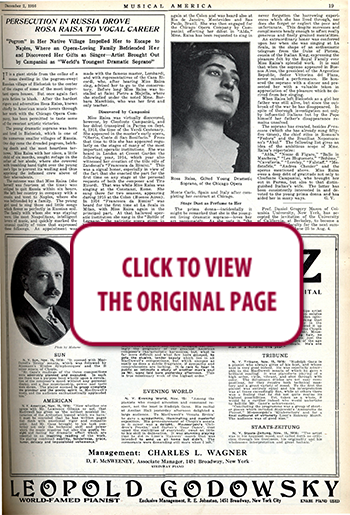 100 YEARS AGO IN MUSICAL AMERICA (174)
100 YEARS AGO IN MUSICAL AMERICA (174)
December 2, 1916
Page 19
PERSECUTION IN RUSSIA DROVE ROSA RAISA TO VOCAL CAREER
“Pogrom” in Her Native Village Impelled Her to Escape to Naples, Where an Opera-Loving Family Befriended Her and Discovered Her Gifts as Singer—Artist Brought Out by Campanini as “World’s Youngest Dramatic Soprano”
IT is a giant stride from the cellar of a mean dwelling in the pogrom-swept Russian village of Bielostok to the center of the stages of some of the most important opera houses. But once again fact puts fiction to blush. After the hardest rigors and adversities Rosa Raisa, known chiefly to American music lovers through her work with the Chicago Opera Company, has been permitted to taste some of the sweetest artistic victories.
The young dramatic soprano was born and bred in Bielostok, which is one of the numerous smaller villages of Russia. One day came the dreaded pogrom, belching death and the most heartless tortures. Miss Raisa with her niece, a little child of six months, sought refuge in the cellar of her abode, where she cowered with trembling hand tight over the young one’s lips to prevent its wailing and thus apprising the inflamed crew above of their whereabouts.
The outcome was that Miss Raisa (she herself was fourteen at the time) was obliged to quit Russia within six hours. She left her country in company with a cousin and went to Naples, where she was befriended by a family. The young girl used to sing those sad little songs which flower so perfectly in Russian soil. The family with whom she was staying were, like most Neapolitans, intelligent lovers of music, and quickly marked the unusual quality of voice that expressed these folksongs. An appointment was made with the famous master, Lombardi, and with representatives of the Casa Ricordi, who, after hearing Miss Raisa sing, advised her to go to the conservatory. Before long Miss Raisa was installed at Saint Pietro a Majella, where she studied under the noted Mme. Barbara Marchisio, who was her first and only teacher.
Discovered by Campanini
Miss Raisa was virtually discovered, however, by Cleofonte Campanini, and her debut transpired in Parma on Sept. 6, 1913, the time of the Verdi Centenary. She appeared in the master’s early opera, “Ober to, Conte di San Bonifacio.” From that time to this she has appeared regularly on the stages of many of the most important operatic institutions. She was heard in London at Covent Garden the following year, 1914, which year also witnessed her creation of the title role of Zandonai’s “Francesca da Rimini.” This was a signal honor, especially in view of the fact that she enacted the part for the first time on any stage at the personal requests of both the composer and Tito Ricordi. That was while Miss Raisa was singing at the Constanzi, Rome. She sang there for two seasons, appearing during 1915 at the Colon (Buenos Aires). In 1916 “Francesca da Rimini” was heard for the first time at La Scala in Milan, with Miss Raisa again in the principal part. At that hallowed operatic institution she sang in the “Battle of Legnano,” the patriotic opera given in honor of Gabriele d’Annunzio.
The same season ·Miss Raisa sang again at the Colon and was heard also at Rio de Janeiro, Montevideo and Sao Paulo, Brazil. She was then engaged for the Chicago· Opera Company by Campanini, effecting her debut in “Aida.” Mme. Raisa has been requested to sing in Monte Carlo, Spain and Italy after completing her contract at Chicago.
Stage Dust as Perfume to Her
The prima donna—incidentally it might be remarked that she is the youngest living dramatic soprano—loves her art passionately. As she puts it, “the stage’s dust is perfume” to her. Springing from humble stock, Miss Raisa has never forgotten the harrowing experiences which she has lived through, nor does she forget or neglect the poor and unfortunate. This despite successes and compliments heady enough to affect really generous and finely grained mentalities.
An extraordinary honor was conferred upon her when she was singing at La Scala, in the shape of an enthusiastic telegram from the Duke of Pistoia, cousin of the Italian King, expressing the pleasure felt by the Royal Family over Miss Raisa’s splendid work. It is said that when the soprano appeared in Buenos Aires, the president of the Argentine Republic, Senor Vittorina del Plaza, never missed a performance. He honored the soprano with a dinner and presented her with a valuable token in appreciation of the pleasure which he derived from her singing.
When Raisa left Bielostok as a girl her father was still alive, but since the outbreak of the war he has disappeared. In spite of thorough investigation not only by influential Italians but by the Pope himself her father’s disappearance remains unsolved.
The soprano has created, besides Francesca (which she has already sung fifty-five times), the chief roles in Romani’s “Fedora” and the Brazilian Nepomuceno’s “Abul.” The following list gives an idea of t he ambitious scope of Mme. Raisa’s répertoire:
“Aida,” “Nozze di Figaro,” “Ballo in Maschera,” “Les Huguenots,” “Bohème,” “Cavalleria,” “Loreley,” “Falstaff,” “Mefistofele,” “Andrea Chenier” and the operas mentioned above. Miss Raisa owes a deep debt of gratitude not only to Cleofonte Campanini, who brought her out in Parma, but also to that distinguished Italian’s wife. The latter has been consistently interested in and devoted to the young prima donna and has aided her in many ways. —G. V.




 RENT A PHOTO
RENT A PHOTO





